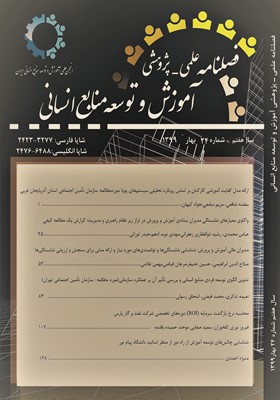مدیران عالی آموزش و پرورش: شناسایی شایستگی ها و توانمندی های مورد نیاز و ارائه مدلی برای سنجش و ارزیابی شایستگی ها
محورهای موضوعی :
حسین خنیفر
1
,
صلاح الدین ابراهیمی
2
![]() ,
بهمن غلامی
3
,
بي بي مرجان فیاضی
4
,
بهمن غلامی
3
,
بي بي مرجان فیاضی
4
1 - دانشگاه تهران
2 - دانشگاه تهران
3 - پردیس البرز داشگاه تهران
4 - دانشگاه تهران
کلید واژه: منابع انسانی, شایستگی مدیران, کانون ارزیابی, آموزشوپرورش.,
چکیده مقاله :
یکی از چالشهای مدیریت منابع انسانی سازمانها بهخصوص در آموزشوپرورش، نحوه انتخاب و ارتقاء مدیران است. بنابراین پژوهش حاضر با هدف شناسایی شایستگیها و توانمندی های مورد نیاز مدیران عالی آموزشوپرورش و ارائه مدل شایستگی مدیران جهت استفاده مراکز ارزیابی برای ارتقاء، انتخاب و انتصاب مدیران طراحي شد. برای انجام پژوهش از رويکرد پژوهش آميخته استفاده گرديد. این پژوهش از نوع آمیخته (کیفی– کمی) بود. ابتدا در مرحله کیفی مطالعه اکتشافی انجام شد و رویکرد پژوهش قیاسی- استقرایی بوده است. روش پژوهش در قسمت کمی توصيفي (غير آزمايشي) و طرح پژوهش همبستگي از نوع تحليل معادلات ساختاری است. جامعه پژوهش در بخش کیفی، کلیه صاحبنظران، اساتید و مدیران ارشد حوزه منابع انسانی در آموزشوپرورش بود که با استفاده از نمونهگیری هدفمند مبتنی بر گلوله برفی با 17 نفر از صاحبنظران مصاحبه شد و در قسمت دلفی 25 نفر از آنها انتخاب شدند. و جامعه آماري در مرحله کمی کلیه مدیران آموزشوپرورش شهر تهران بودند که با استفاده از روش نمونهگیری خوشهای 462 نفر بهعنوان نمونه انتخاب شدند. ابزار پژوهش در مرحله کیفی مصاحبه نیمه ساختار و در مرحله کمی پرسشنامه محقق ساخته بود. برای تحلیل اطلاعات در قسمت کیفی از روش کدگذاری باز و محوری و تحلیل دلفی و در قسمت کمی از روشهای تحلیل توصیفی، تحلیل همبستگی و تحلیل معادلات ساختاری (تحلیل عاملی تاییدی مرتبه دوم) استفاده شد. نتایج پژوهش نشان داد مؤلفههای الگوی شایستگی مدیران آموزشوپرورش عبارتاند از: شایستگی دانشی، شایستگی حرفهای، شایستگی شخصیتی، شایستگی اجرایی، شایستگی رهبری و هدایت، شایستگی ارتباطی و شایستگی ادراکی.
Education is a very complex and sensitive issue, and the sustainability of a society depends largely on the efficiency and effectiveness of the education system. If the education system can properly fulfill its mission of individual and social development, it will also provide a favorable environment for cultural, economic, political and social development in society. It goes without saying that a great deal of the complexity and sensitivity of the education system goes back to the competencies of senior education managers. One of the challenges of HRM in organizations, especially in education, is how to select and promote managers. In this regard, the evaluation process process is used as a guideline for evaluating and effectively developing competencies in workplace-like conditions. Therefore, the present study was designed to identify the competencies of higher education managers and to present managers' competency models for use in evaluation centers. Mixed research approach was used to conduct the study. The research population in the qualitative section was all experts, professors and senior managers in the field of education, who were interviewed with 17 experts using snowball based sampling and the statistical population was all of the education managers in Tehran. 462 individuals were selected using cluster sampling method. The research instrument was a researcher-made questionnaire in the quantitative phase. Its validity was confirmed by experts and its reliability was confirmed by Cronbach's alpha test. Semi-structured interviews were used in the qualitative part. In the second step, quantitative method was used in descriptive-analytical method. Based on this, competencies of education managers for use in evaluation center were identified and then the model of competency of higher education managers for use in evaluation center was presented. To estimate the validity of the proposed model, second-order confirmatory factor analysis and structural equation modeling with partial least squares method were used. The results showed that the components of the model of education managers competency for use in the evaluation center are: knowledge competence, professional competence, personality competence, executive performance competence, leadership and guidance competence, communication competence and perceptual competence.
